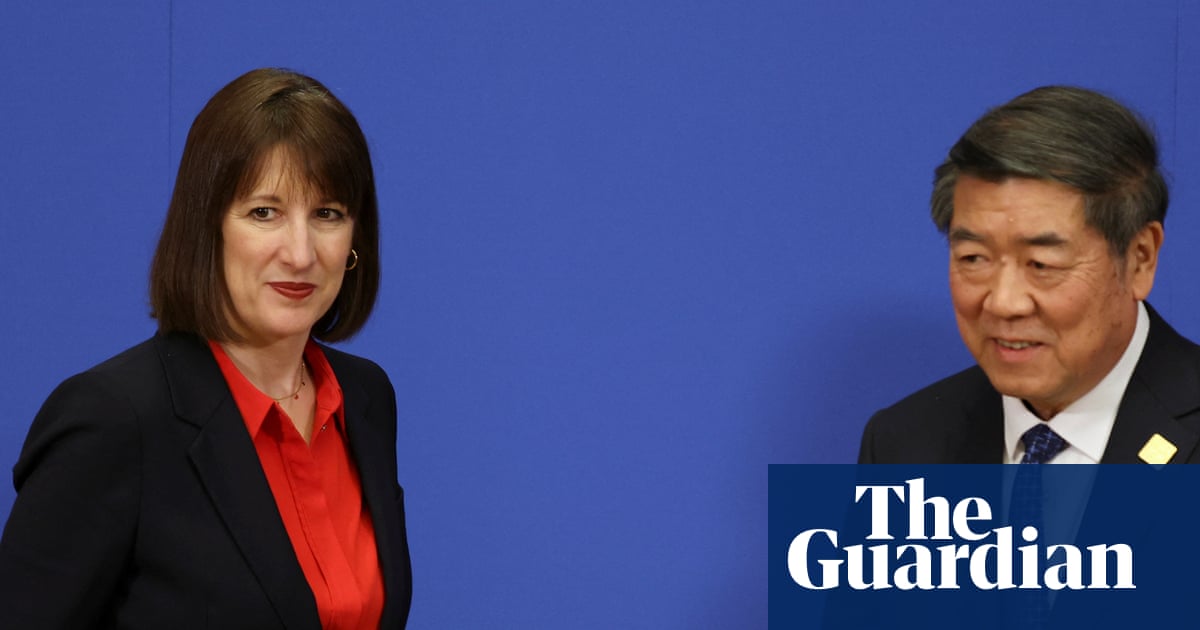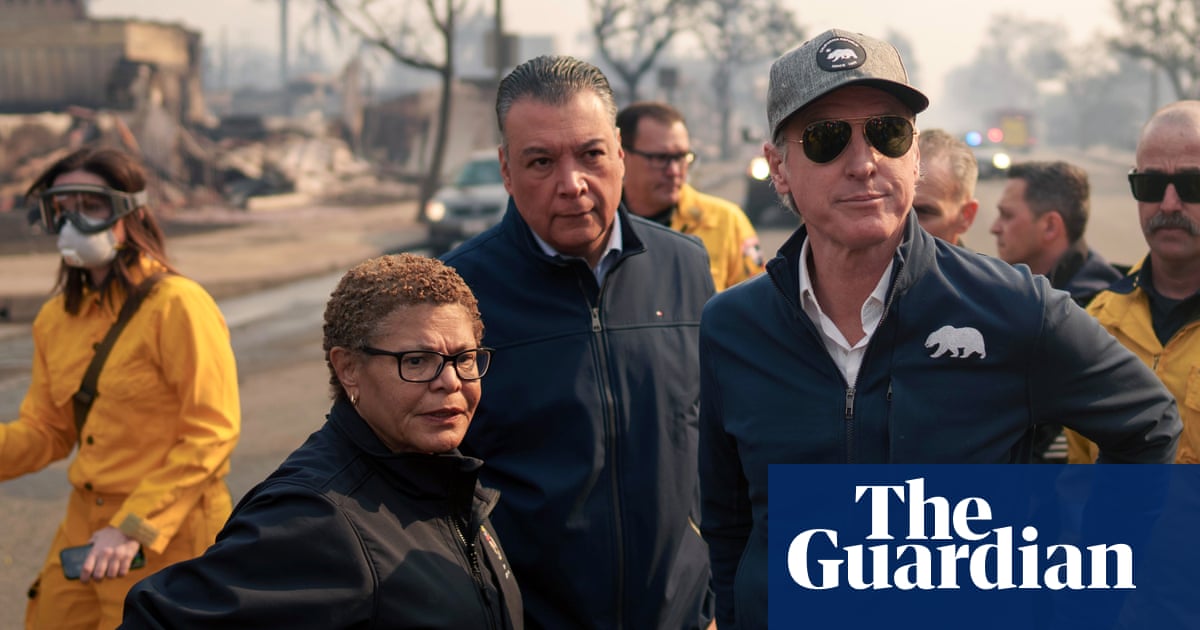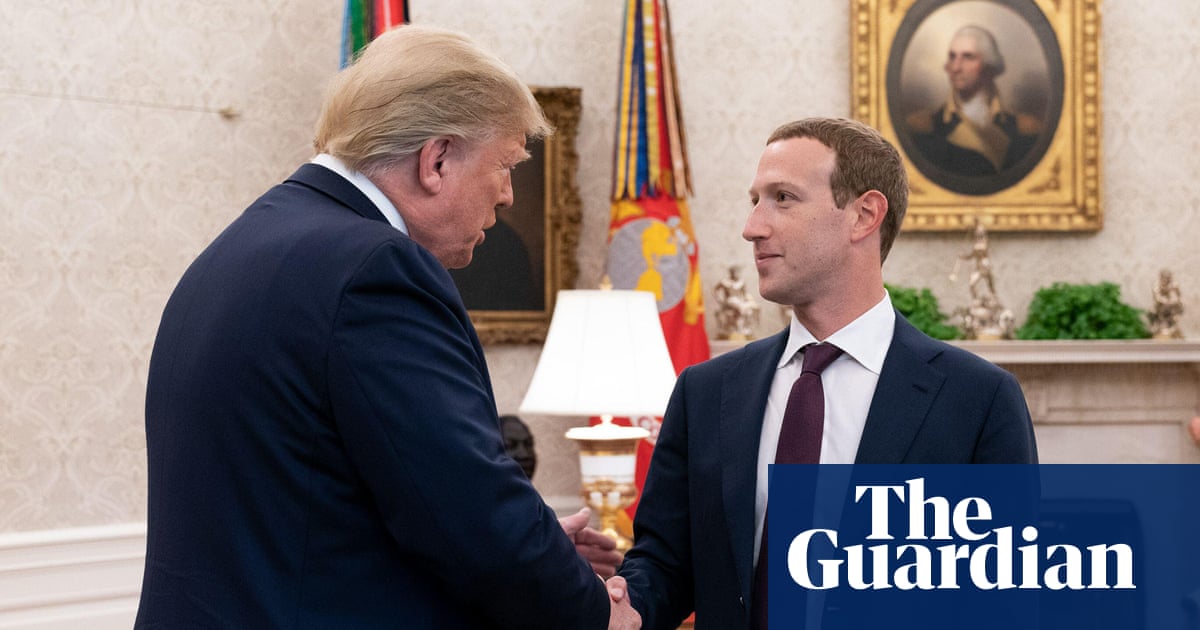Faith, death and vengeful vaping: of all the Oscar contenders this year, Conclave is the one that best combines chewy religious inquiry and lavish side-eye. Adapted by Wolf Hall screenwriter Peter Straughan from the Robert Harris novel, Conclave has been directed by All Quiet on the Western Front’s Edward Berger as a heavy-breathing battle for hearts, minds and power.
Ralph Fiennes stars as Cardinal Lawrence, who, after the sudden death of the pope, must park his own religious doubts to wrangle the 113 cardinals who have descended on the Vatican. These men will be sequestered until they can elect one of their number as the new pontiff. Among them are the gentle progressive Bellini (Stanley Tucci) and smooth traditionalist Tremblay (John Lithgow). Both have secrets. But are they as lethal as those of their friends – and rivals?
The film was shot in Rome 20 months ago; triangulating the actors’ schedules for a reunion seemed to take almost as long. Fiennes is completing work on a new Alan Bennett adaptation and zombie follow-up 28 Years Later; Tucci shooting the Russo brothers’ latest and promoting his new memoir; Lithgow stars at the Royal Court in new play Giant, as Roald Dahl, railing against accusations of antisemitism.
In the end, they all dialled in early one morning from different parts of London. Fiennes was in a tasteful kitchen and vast cardie, Tucci his home office, teetering with books and sketches, while Lithgow beamed from a creamy Chelsea rental.
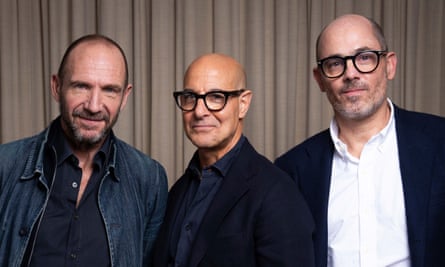
Catherine Shoard: Did any of you find or renounce God while making the film?
John Lithgow: No. But we were in Rome, so taking a warm bath in Renaissance Italian art, which is as Christian as you can get. And we were working on something that really felt worthy. So it was a spiritual experience.
Stanley Tucci: I was raised Catholic but broke with the church. It just never made sense to me. It was a myth I had great difficulty believing. But as John said, being in Rome is always incredibly moving. I remember as a kid living in Italy and being profoundly moved by the experience of going into a church, simply because of the art and the amount of time and energy that was devoted to creating it – and sustaining the myth. But it didn’t sway me one way or the other.
Ralph Fiennes: I feel a bit differently. My mother was a committed Catholic, but quite enlightened. She had brothers and a great uncle who had been priests. My great uncle, Sebastian Moore, is quite a well-known theologian. So God was not unfamiliar to me. Questions about faith were something I grew up with.
I rebelled against my upbringing when I was 13. I said to my mother: “I’m not going to mass.” I didn’t like the heaviness. There was a very claustrophobic, dominant feeling from the church in Ireland, where we then were living, in the early 70s. I hated the sense of compulsion and constriction.
I don’t think of myself as a practising anything, but I’ve never stopped having a curiosity about what it is to have faith. I’m also very moved by what we can encounter with the art the church has produced. Not just the Catholic church. I was in Thessaloniki recently and went to a museum of icons there, which was profoundly moving. What is it that makes us want to build these churches and shrines? Faith is a huge, potent thing that mankind seems to want to have, even if the forces of logic and science and reason go against it. I’m curious about that energy.
CS: Why are people drawn to faith?
RF: It’s about looking for answers. Life is messy. Life is shitty. Life is unpredictable. I think human beings want a sense of coherence in their inner selves. And often faith does contain helpful guidances or moral rulings. Of course, the Catholic church has done terrible things. It’s full of twisted and dark corners, but all power structures will go that way. I think the precept of a faith brings people together and gives communities a sense of coherence.
Christ was teaching at a time when tiny communities were held together by messengers on horseback or on ships, taking letters or preaching vocally. They didn’t have mass communication. So in a small community, how you cohered was really important. I have some experience with visiting Inuit peoples in northern Canada, where they worship animals and have a real respect for the elements. Their communities have been totally shattered and wounded by encounters with the Christian churches. But they have their stories which help them survive and cohere.
ST: I think that this sense of camaraderie and community is something we all long for and there’s no question that the church does that. But we create these ideas of God, or gods, because the world is chaos. It’s to dispel our fears. We have no control over our lives and that causes anxiety. Fear of death is the most potent; we’ve created all these constructs to make ourselves feel better about when we or a loved one dies.
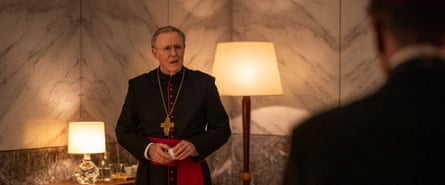
Each society has their own construct to dampen those fears, to make it OK. If we think about religion as making order out of chaos, it’s exactly the same thing that art does. And yet so much art has been created by the church. Of course all of these incredible artists could only paint religious subjects. I have faith, I have faith in art. That’s where my faith lies.
JL: What they said! It’s such a deeply thought-out film. What’s fascinating about telling a story like this is the context of a political event – the election of a new pope – and examining the electorate. The college of cardinals are all men who’ve been drawn to religion by a longing to commit their lives to faith. And so wholeheartedly that they are at the top of the food chain of a great big religious construct.
But when it comes right down to it, they all have to vote and compete. There are rivalries and betrayals and deceptions and jealousies and ambitions and aspirations, all of which go counter to the entire reason they’re there: a devotion to Christ and the idea of the Catholic church. Any story with that tension between virtue and sin is automatically great. I think that’s why people are responding so fervently to this film. They see these tensions: men who went into something for deep personal reasons that have gradually been eroded by ambition.
CS: Do you think there’s anything unhelpful about the drama of elections? Are we addicted to horserace narratives?
JL: It’s inevitable when a leader is chosen that it’s going to get political. But it’s just an incredibly interesting moment for this film to arrive. While we were shooting the film, there was the great fight in the US House of Representatives for the House speaker. There were 15 ballots before Kevin McCarthy finally survived the process – it was just like what we were acting out.

That was uncanny event No 1 – the second is what happened two weeks ago. Had the only voters in that been the cast and crew of Conclave, there would’ve been the opposite result. There’s a great liberal tradition in film – and the great example is Mr Smith Goes to Washington. The forces of corruption and money in politics fail at the end and the simple man prevails. That’s very much the movie paradigm. And Conclave basically follows those rules. It’s just amazing the tide has turned so much in the last few weeks. It makes our movie into a kind of wish-fulfilment story – which I think is another reason people have been attracted to it.
ST: The film does follow a certain trope, in a way, as the book did. But it’s a fascinating one – and not an easy one. So often movies are made just to make us feel better. That’s why there are so many happy endings in movies, because there are so many unhappy endings in life.
CS: In the film someone pointedly says that the papacy is a heavy burden for an older man. Should there be an upper age limit on positions of power? Or even voting for them? In real life, cardinals can’t vote once they’re over 80.
RF: It would be a great guideline in the current US government: 80 as a signoff. We’d have two years of Trump but not four.
JL: I don’t think it would pass Congress at the moment.
RF: But maybe that’s a good idea, to have an age limit on any electoral governmental ruling system. I’m sure that’s smart, but who decides whether it’s 75, 80, 70? There are plenty of people with alert minds working vigorously into their early 80s. But the patriarchal element seems to me one of the looming themes, that begs all kinds of questions. Stanley’s character, Cardinal Bellini, articulates the very, very vital issues of how the church should go forward in relation to gender and sexual identity and diversity. Mostly the film has been well-reviewed. Some people seem to think it’s a bit simplistic, but I think it puts on the table quite coherently and intelligently big themes that could be discussed without it being an attack on the church.
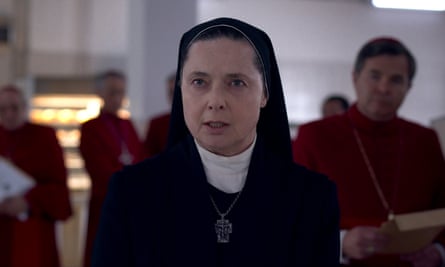
The Catholic church is riven with it. That’s why it’s very frustrating to read Saint Paul: he preaches love, but his strictures on women are just horrendous. It’s so conflicted. It needs a good clean out. And yet these patterns of behaviour do seem to appeal to all the world. People love the ritual. They love the tradition. It’s kind of a conundrum, isn’t it? The church is so potent. Clearly it does good. It does lots for suffering peoples and the poor, but it’s also got this other side where it’s so backwards in its conventions and thinking. Its traditions are holding it back.
CS: What can the church do to change?
ST: Priests should be able to get married. That changes everything. And nuns. Why can’t you be devoted to God and love someone at the same time? I don’t understand that. Priests used to be married many years ago but the Catholic church stopped that. The excuse was that priests needed to devote themselves to God. But really it was because when they died, everything went to their wives. It wasn’t about devotion but money. And I think that’s a problem. Priests being able to be married would ground them in reality and only enhance their spirituality. Let’s just start with that.
CS: Yet in the US the democratic process recently embraced a return to patriarchy. Why are people drawn to institutions and leaders who seek to roll things back?
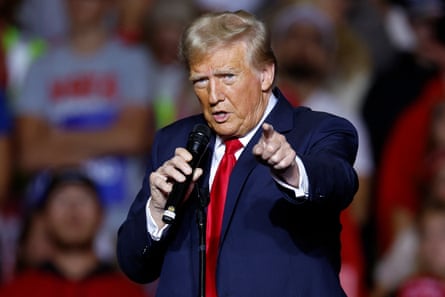
RF: I think it comes back to a story and how it’s put out. Trump told a story. The way he described the problem with America and what he could do, was a story. He has a remarkable gift for talking and accessing people’s deeper gut feelings. And the story in its simplicity appealed. Whatever you think of the horror of the language and the racism and sexism that we all identify on the liberal side, it speaks to people. He’s the man in the bar who says: “I’ll get rid of this shit. We’ll make your lives better.” His win was a visceral response to a man saying: “I’m going to sort it for you.” Basically, his story won. It’s not my country, but it seems to me that the Democrats were increasingly perceived as a sort of removed elite. Theirs wasn’t a story that I think was put across very strongly. Trump told the best story, whether you like it or not.
JL: He also told the story of the Democrats. He dominated the narrative with a much bolder, louder voice, and with the support of a huge amount of the media. Story is a very potent word in in this conversation. The Democrats couldn’t get their story out, or whatever was persuasive and compelling about their story couldn’t rise above all the noise.
ST: By simplifying everything, he distilled it down to ideas that were very easy for people to grasp.
JL: And that’s how tyranny operates.
ST: He just played on everyone’s fears and he did what so many fascistic-minded people do, which is find a scapegoat: immigrants. It’s always the other. So people go: that’s why I have no money, because of that guy. It’s not true, at all. But it works. It’s worked before and it worked again.
RF: It seems the rate of inflation in America has wrong-footed a lot of people; the price level people are used to dealing with suddenly went up.
JL: Well, there was a simple story to tell there that never got articulated: inflation was substantially a result of the huge crisis of Covid and it had been coming down steadily for months. The Biden administration was doing a very good job at handling an inflation crisis, but that story never got told. And it doesn’t matter how many graphs you see in a newspaper, it still feels like prices are too high. But prices are too high because the country suffered a traumatic economic episode. It was being handled. God knows what’s gonna happen now, with tariffs being the new go-to solution. They’re gonna create inflation.
ST: How are tariffs gonna help? I don’t know.
CS: Conclave is a very theatrical film. Does all the smoke and bling and the costumes attract certain people to the pulpit? Someone like Trump – embraced by the religious right – is used to being immediately judged on his performance.
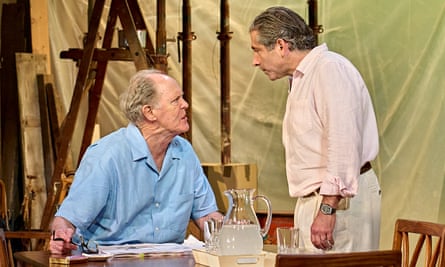
RF: The spoken word in the space to a body of people is the business we’re all in. There’s John every night embodying Roald Dahl with extremely toxic views. In a way that’s a pulpitian provocation. That’s what the theatre does – and Giant is a fascinating, compelling play. As actors, when we speak on a stage and we have our audience, that’s a potent thing that’s created. I don’t know that people are drawn to the church so that they can always be speaking, but clearly if you are a priest, there is that moment when you get up and you deliver your homily for the week. You have to put across a view or a lesson or a teaching or an idea that is meant to send your community out with, hopefully, questions to improve their moral wellbeing or the way they engage with life.
My memory of listening to homilies is that they are sort of provocations based in the religious text that say: think about this or think about that. How we listen as a congregation is fascinating. That’s why I love what the theatre is.
JL: There’s something in all of us three – actors, not men of the cloth – that is mainly interested in impact. We just wanna reach people, and we’re playing roles and we’re telling stories that are not our personal stories. But the three of us have had hundreds of experiences of reaching people, throttling them with theatrics, making them laugh or cry or scream out in horror.
RF: Or go to sleep.
JL: Our great ambition is to wake them up and to startle them and get huge rounds of applause. There are two major, beautifully written speeches in our film that have an extraordinary impact on the college of cardinals. That’s why we are in the game. We understand the thrill of succeeding at making an impact.
RF: And we understand that crushing disappointment when you realise you haven’t made the impact you’d hoped.
JL: Oh, it’s awful!
CS: The characters you play are trying to emulate God and falling short. As actors who are public figures, are you more conscious of being treated like quasi-gods – and of your own failings coming under more scrutiny?
JL: Different types of actors are treated very differently. I’m a strange actor who’s gone off and done extremely peculiar roles. I’m the go-to psychopath or hypocrite or villain from time to time. I guess all three of us are character actors in a sense. My whole game is surprising people. I have a sort of perverse enthusiasm for upending people’s expectations of me. People don’t go to me for political wisdom. I come off very pretentious if I get anywhere near that kind of talk. But my acting is completely surprising and sometimes revolting. I just go for it.
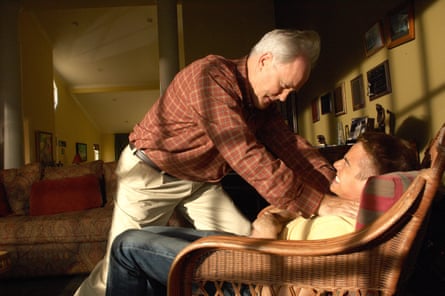
ST: These people are trying to emulate God and yet they created God. So that’s weird. But without question, people in the public eye are always under more scrutiny. You’re larger than life. But I think that’s changed over the years. You used to see actors on stage, from a distance, in a proscenium. Then you saw them in movies, but still in this big rectangle. Everybody was big and what they did was big. Over the years things got smaller and smaller and now you can put me in your pocket.
That changes the way we look at people. It used to be only posthumously that you’d find out somebody in Hollywood was a sexual deviant or a terrible drinker or whatever. In life, it was like: let’s just leave them alone. And everybody did. Television altered how much access to people you were allowed. But now, you can watch me on like your wristwatch and that changes the way you look at me. So people realise that yes, actors are just people. But they still want them not to have these faults. Yet they can’t wait to find out about them.
JL: It’s interesting to hear you talk about this, Stanley, because of the three of us people have come to know you the best.
ST: Because I made that food show.
JL: But that food show is very much the Stanley show and the world has got to know you so well and like you so much. In Rome you were virtually worshipped in that wine shop.
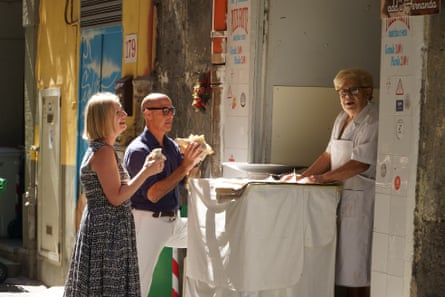
ST: That was really funny. I remember when we went to a grocery store. You were always able to hide behind a persona or a character. So it’s odd because it’s the first time I’ve ever just been myself. And I was very uncomfortable with it at first, even though it was my idea. I don’t know what I was thinking, and now I’m more comfortable with it. I know the idea of connecting through food makes people so happy, so that makes me happy. I just think it’s a nice thing. But I’m never eating Italian food again …
RF: I don’t know if priests are emulating God. I think they’re meant to be conduits or shepherds for the message. We’re all sinners – even priests. I think priests or nuns are mostly just answering a calling to preach the message. But of course, if you are preaching the message and you’re in the pulpit, naturally people will expect that you are going to be an example. Cinema is very potent in how it puts an actor’s face on screen. We are conduits for a playwright or a character, we’re not there necessarily preaching a religion or political idea or any kind of philosophy. We’re just drawn to roles. We’re drawn to the drama. The workings of cinema are so keyed into key myths that we want to keep telling ourselves. So audiences will project on to actors huge things, and the media massages the sense of projection. So you suddenly can feel very exposed. People in all forms of entertainment can suddenly realise that there’s an expectation of them as a private person. I think that’s troubling.
CS: There are two lines in the film I want to ask your opinion on. The first is: “Things fall apart. The abyss calls out.” Which is a warning from one cardinal about what will happen if the church embraces liberalism. Where do you see the church in 50 years’ time? The second is Stanley’s character’s line that to not know yourself at his age is shameful. Is it, and do you?
ST: I’m still learning about myself and trying to make myself better. I don’t always succeed. Sometimes we know ourselves and sometimes we just don’t. I don’t fully know myself. I worry that I’m going to have an epiphany about myself on my deathbed. Then I’ll just die sad.
CS: What might it be?
ST: Suddenly it’ll occur to me that I really just don’t like myself at all. And then it’ll be over. I’d have no time to rectify it.

JL: You’d have time for a phone call, Stanley.
ST: But I’d wanna go back and change things and make things better and I’ll just be dead.
JL: By now, I have settled into a strong sense of myself as a good actor. I wouldn’t work all the time if I weren’t good at it. What I love about the profession is also what makes me feel a little guilty: it seems the most irresponsible thing you can do. Your lines are written for you. Everyone takes good care of you lest you miss a performance or lose a shooting day. You’re treated like a much bigger deal than you actually are. But I think the more you are content with that self-image, the better off you are.
RF: I would like to think the church will evolve by dialogue within itself. That it can be a force for good. But I think the evolution of the church is going to be difficult and hard. Our journey through life is a constant evolution with relation to ourselves and in relation to others with whom we connect. There are always traps for us as individuals with our egos and our sense of anxiety. The best of the church or any faith, or any structure, or just your therapist, is in helping each other deal with the world.
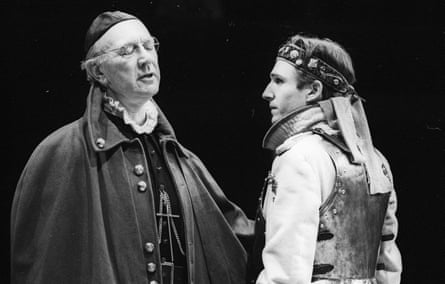
The acting community at its best is wonderful at supporting each other. The experience where I thought this, at its best, is a fantastic profession to be in, was a production of King John, directed by Deborah Warner at the Royal Shakespeare Company in 1988. The sense of ensemble and community was so fantastic in that production. Everyone flowered in their parts and within themselves as a group. The best the church can be is as a fantastic group. And the energy and the positivity of the group reaches out, and groups everywhere are wonderfully self-supportive of each other.
ST: That’s the ideal, but I worry that this right-leaning ideology that’s taking over so much of the world will once again make the church retreat. And that’s really scary.
RF: But at the end of our film, the group celebrates the person who seems to me to carry the spiritual depth and coherence and integrity that is needed. Going forward in the world now, we’re very frightened of what might come at us because of what’s happened. But we mustn’t lose sight of the power of what we can have. We must keep intact our aspiration to an ideal.

.png) 1 month ago
30
1 month ago
30

